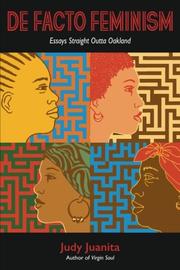


DE FACTO FEMINISM
Essays Straight Outta Oakland
by Judy Juanita
This extraordinary set of autobiographical essays gives insight into a black woman’s life in the arts: everything from joining the Black Panthers to avoiding African-American chick lit.
Juanita (Virgin Soul, 2013) grew up in Oakland, California, in the 1950s. She remembers a “goody-goody” childhood of reading, spelling bees, and chores. America at the time was “a Jell-O & white bread land of perfection and gleaming surfaces,” she notes in her essay “White Out”; the only blacks on screen played mammies and maids. She joined the Black Panthers at San Francisco State in 1966 and became a junior faculty member in its Black Studies department—the nation’s first. In perhaps the most powerful piece in the collection, “The Gun as Ultimate Performance Poem,” written after the death of Trayvon Martin, Juanita sensitively discusses the split in the Black Panthers over carrying guns. She liked guns’ symbolic associations and even kept one in her purse while working at a post office. But she now recognizes the disastrous consequences of romanticizing a weapon: “It was Art. It was Metaphor. It was loaded with meaning and death.” In another standout, “The N-word,” she boldly explores the disparate contexts in which the epithet appears: in August Wilson’s play Fences, in comedy routines, and intimately between friends. “It’s not problem or solution; it’s an indication,” she concludes. The title essay contends that black women are de facto feminists because they’re so often reduced to single parenting in poverty. Elsewhere, she discusses relationships between black men and women, recalls rediscovering poetry as a divorcée with an 8-year-old son in New Jersey (“Tough Luck,” which includes her own poems), remembers a time spent cleaning condos, and remarks that Terry McMillan has ensured that a “black female writer not writing chick lit has an uphill challenge.”
The author refers to herself as “an observational ironist,” and her incisive comments on black life’s contradictions make this essay collection a winner.